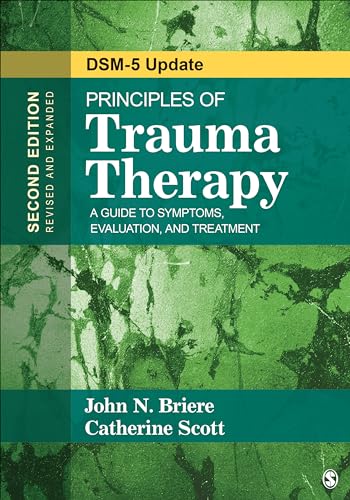Principles of Trauma Therapy
A Guide to Symptoms, Evaluation, and Treatment ( DSM-5 Update)
John N. Briere; Catherine Scott
BOOK REVIEW

In a world where emotional scars often go unseen, Principles of Trauma Therapy: A Guide to Symptoms, Evaluation, and Treatment (DSM-5 Update) by John N. Briere and Catherine Scott emerges like a beacon in the fog of despair, offering not just information, but a powerful roadmap toward healing. This isn't merely a book about trauma; it's an urgent call to acknowledge the sufferings lingering in the shadows of our society. 🌪
With unwavering candor, Briere and Scott lay the groundwork for understanding the multidimensional aspects of trauma-its symptoms, its evaluation, and the myriad treatments available. The authors deliver a clear-eyed analysis, dissecting how trauma manifests in our lives, shaping our emotions, relationships, and behaviors in ways we often fail to recognize. This is not just a textbook; it's a vital tool, intricately crafted to enlighten clinicians and everyday readers alike about the silent battles that wrap themselves around the human psyche.
The late publication of the DSM-5 has made this update even more critical. It takes into account the evolving nature of our understanding of trauma, reflecting the latest findings and best practices within the mental health community. Herein lies an exploration of symptoms that go beyond mere clinical categorization. It dives deep into the heart of human experience, challenging you to confront the uncomfortable truths of distress and dysfunction. The narrative unfolds in a manner that evokes both empathy and urgency, compelling you to consider the transformative power of therapeutic intervention.
Readers praise the book not just for its academic rigor, but for its accessibility. Some have expressed that it reads like a conversation, one that is urgently needed in our fragmented discourse surrounding mental health. Critics, however, have pointed out that it may skim over the granularity of individual trauma experiences, choosing broad strokes over the fine details. But such critiques are perhaps missing the forest for the trees; the real strength of this work lies in its holistic method of integrating trauma therapy into a practical framework that can lead to genuine healing.
There's something profoundly uplifting about the authors' ability to illuminate a path forward. They urge practitioners and loved ones alike to demystify trauma, to approach it not as an insurmountable foe but as an opportunity for connection and growth. This work cultivates not just knowledge, but compassion. It reminds us that those entangled in the throes of trauma are not pariahs, but individuals deserving of understanding and love. 💖
What's particularly striking about the approach presented in this book is the palpable sense of urgency; the authors seem to whisper in your ear that time is of the essence. The longer we allow the stigma around trauma to fester, the more we risk losing precious connections-both to ourselves and to one another. You'll find that every chapter beckons you to not only understand the mechanics of trauma but also to feel its impact deeply. This emotional resonance is what makes the book so unforgettable; its insights settle within you, demanding your reflection, even several days after you close the cover.
Reflecting on the multitude of lives transformed through these teachings-therapists who have embraced these principles, patients who have reclaimed their narratives-you can't help but feel a stirring of hope. 💫 Not only has this work shaped the practice of countless mental health professionals, but it has also sparked conversations in homes and communities where silence once reigned.
In a time when mental health discussions are burgeoning yet still often limited in scope, Principles of Trauma Therapy challenges this status quo and inspires you to confront your own biases and misconceptions surrounding trauma. With its distinct combination of compassion and clinical knowledge, it insists you acknowledge not just the symptoms but the humanity behind every experience.
Let this guide not be just a reference on your shelf, but rather an essential companion in your journey-whether you're a therapist, a family member, or someone grappling with your own wounds. Embrace its teachings, and begin the profound work of healing, together. This isn't merely about trauma; it's about our shared humanity, our ability to rise from the ashes, and to heal in communion. 🌱
📖 Principles of Trauma Therapy: A Guide to Symptoms, Evaluation, and Treatment ( DSM-5 Update)
✍ by John N. Briere; Catherine Scott
🧾 440 pages
2014
#principles #trauma #therapy #guide #symptoms #evaluation #treatment #update #john #briere #JohnNBriere #catherine #scott #CatherineScott